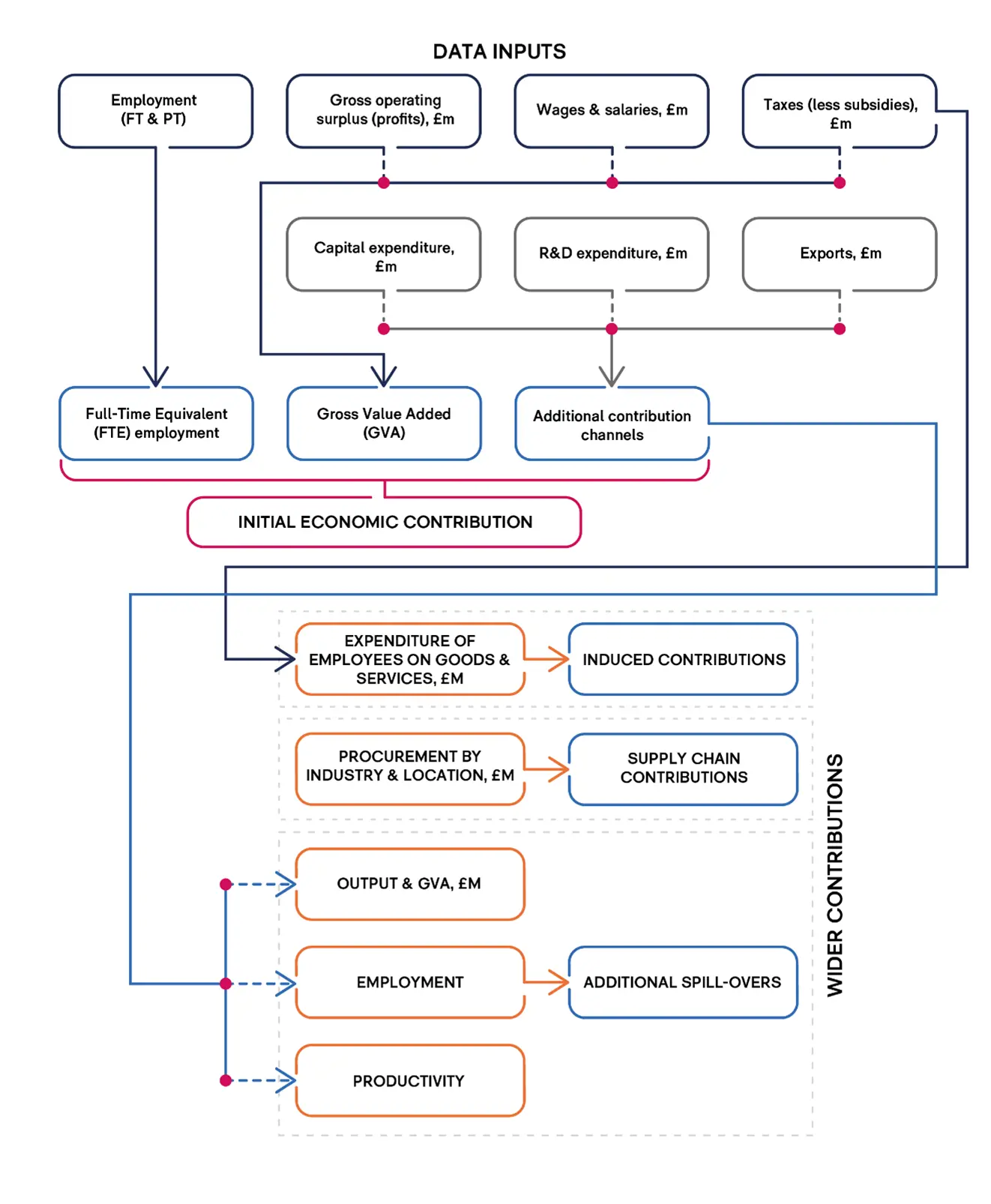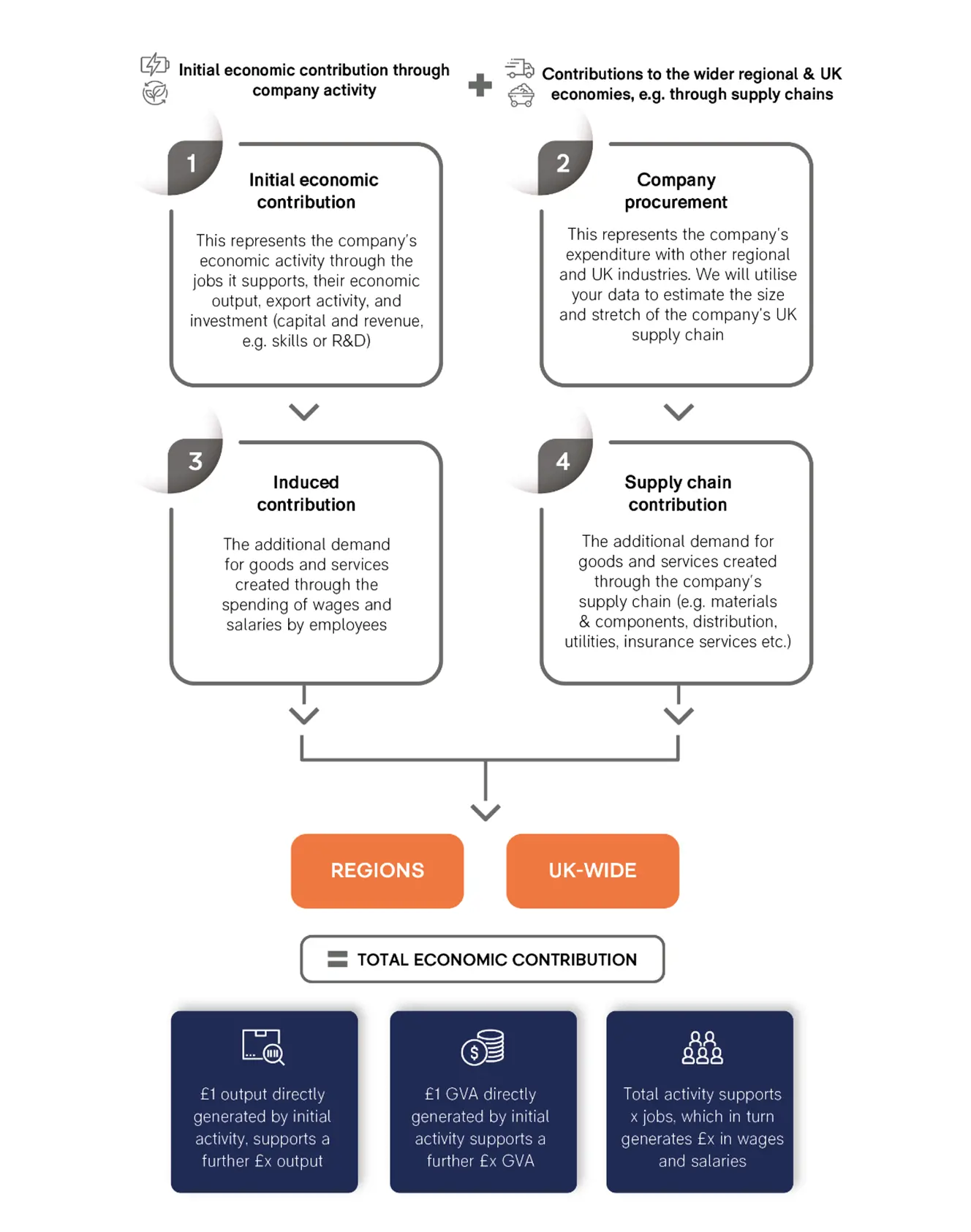Explaining the rigour and reason behind the way we model a firm’s or sector’s economic contribution and impact.
Understanding the value a business or sector contributes to the economy can be a compelling way to underpin an argument or business case for policy change.
Whether you’re talking about economic impact or economic contributions, both essentially describe a business or sector's gross value added (GVA) to the UK economy – and that is the income generated which can be re-spent or reinvested in the economy.
To calculate this we typically look at their financial, employment, and procurement data. We use this information to estimate how much money and how many jobs they create directly and indirectly.
Our in-house CBI Economics model looks at the connections between a business or sector and other parts of the economy. This helps us see how their activity and spending affect other businesses and people. Unlike others in the market, we opt for a "bottom-up" approach that relies on a business or sector’s data through data collection forms or a survey, rather than a "top-down" approach that uses general information about their industry. We find this takes a bit longer but provides more accurate results.
These relationships and impacts are looked at through the input-output framework (see figure 1), a recognised methodology for economic impact assessments which maps how a business or sector’s procurement and investments flow through the economy and how different parts of the economy are connected.
We use information from the UK and Scottish National Accounts to understand how money flows between industries and other parts of the economy, like households and the government. Through this, we can see their full impact on the economy.
Figure 1 provides an illustration of these linkages – from the inputs we collect as part of a project, on financial, employment, and procurement data, to some of the intermediate and final contributions outputs the modelling can provide.
Figure 1: Overview of our data analytics framework

As with any worthwhile endeavour, the more work we put into the data collection process, the more robust the outputs we produce. So, whilst this process can be time consuming, relying less on standardised models of the economy and using ‘bottom-up’ company data wherever possible can lead to more credible and robust evidence. This will ultimately be more likely to convince your key audiences and more likely to withstand government scrutiny. At CBI Economics, we work with our clients to guide them through these data requirements and discuss what is available to them.
Figure 2 sets out some of the final outputs that you may have seen quoted in research papers or in the news.
Figure 2: Overview of the economic contribution model

All of this can be seen in action in a few projects we have delivered recently including:
· A report we published for the retail sector to look at the contribution of retailers to our high streets, including findings which showed they touch all parts of the economy and support a fifth of jobs (5.7 million) across the country. The evidence was used here to make the case for important changes in business rates and the apprenticeship levy in order to unlock sector investment.
· Our valuation of the business travel sector and travel management companies in particular for the Business Travel Association. This report helped to argue for the benefits to the wider economy from continued business travel in light of the recent shift in ways of working since the pandemic.
· A recent report which looked at an energy-from-waste company’s impact across the UK. This helped to showcase the importance of home-grown energy solutions to both decarbonising the UK economy and unlocking green growth.
About CBI Economics:
At CBI Economics, we have a team of dedicated economists with wide-ranging experience in developing socio-economic evidence to help you make the case for policy changes and demonstrate the societal value of your activity. We can help you calculate the fiscal costs of your policy ideas, demonstrate their economic impact, and even help you to best articulate the issues you face through economic evidence.
Read the CBI Economics insights for the latest examples of our work.
Get in touch today to find out more about economic consultancy from CBI experts.









